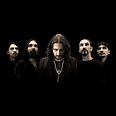
Israeli Arab, Jewish metal bands tour together for peace
Heavy metal groups Orphaned Land, Khalas to share bus during 18-day European tour aimed at spreading message of coexistence
VIDEO - While Israelis and Palestinians have battled ineffectively for decades to find a common ground, there are a few individuals who unite through a mutual love for heavy metal and the belief that music can surpass politics and religion, bringing people together despite their differences.
Two Israeli bands, one Jewish and one Arab, have joined forces in 'metal brotherhood' to practice what they preach – a message of coexistence and peace.
Israeli-Jewish band Orphaned Land and Israeli-Arab group Khalas (which means 'enough' or 'stop' in Arabic) are currently en route an 18-day European tour to help spread the message of coexistence and harmony between the two conflicting sides.
The two bands will not only share the stage, but also a tour bus for three weeks to be an example of tolerance. Their music styles are similar as they fuse classic heavy metal elements with Arabic rhythms and instruments. The result? Oriental Metal.
Shalom Life had a chance to speak to Kobi Farhi, the vocalist for Orphaned Land, and his good friend, Abed Hathout, guitarist and band manager for Khalas, on how these two bands got together for this peace-promoting heavy metal tour.
"Kobi and have been friends for years now, and we've always talked about hitting the road together," Hathout tells me. "One day he gave me a call and told us he wants us (Khalas) on board with an Orphaned Land tour. We reached out to this publishing company 'Media Men Group' and they were really excited when we told them about the idea, because luckily, the tour represents what they believe in: peace. They've helped make this dream come true."
"We are simply showing that music is one of the strongest hopes of our times," adds Farhi. "While politicians and religious leaders work for years just to get themselves into the negotiation table, Orphaned Land and Khalas would share and live inside of a bus. That's a lesson to our leaders from any kind, religion or politic - grow up!”
Orphaned Land, which have been playing music together for nearly a quarter century, are known for spreading political messages through their music while promoting peace. On the cover of their latest album, All Is One, the symbols of Christianity, Judaism, and Islam are depicted united as one.
Khalas' latest album features metal covers of '80s Arab wedding songs. Hathout explains that, though their joint tour with Orphaned Land has been met with positive reinforcement from the Huffington Post, Guardian, CNN and more, there are those out there who simply cannot get on board.
"There are always those fanatics who don't like any type of collaboration whatsoever between Palestinians and Israelis," explains Hathout. "They say that our collaboration is a normalization with an occupation system, but we say what are you talking about?!! We are just two bands hitting the road together in Europe. Sure, one happens to be Palestinian and one happens to be Israeli, and yes, it happens to be that we are friends and consider each other as brothers, so what?!"
While heavy metal music may not be the customary approach to bridge the gap between Israel and Arabs, this method through music has been used before. In 1999, Israeli conductor Daniel Barenboim and the late Palestinian intellectual Edward Said founded The West-Eastern Divan Orchestra, consisting of Israeli, Arab, and Spanish musicians, and based in the Spanish city of Seville. It looks like Hathout and Farhi hope to copy this blueprint to educate the masses on how easy it is to coexist.
"Its great we are really luck to be able to do this with a great band like Orphaned Land," Hathout says. "Beside that their music is awesome they are also amazing people. It's unfortunate that this entire region cannot also be like this; I mean, if two bands can share a bus, then people from two sides can share this land. We know that our reality is different from the current situation, but we feel that our tour is a seed of hope. It does not reflect the reality of this region now, but maybe if we reach enough people, one day it can."
Reprinted with permission from Shalom Life










